“Hoop” is dat wat veren heeft—
Wat roest op het gemoed—
En wat een deun zingt zonder woord—
Wat nooit een afscheid doet—
En liefste—in de Wind—gehoord—
En kwaad de storm moet wezen—
Die de kleine Vogel slopen kan
De kou voor veel genezen—
Ik vernam het in het kilste land—
En op het vreemdste Tij—
Alsnog, nooit, in het Uiterste,
Vroeg het een kruim—aan Mij.
— Translation into Dutch of Hope is the Thing with Feathers, Emily Dickinson
Excerpt of "Lights Up in a Muddy Sky"
“Is there someone in the house tonight?” Violette stood in the doorway, her toes balancing on the slight raise of hard wood. Her feet were bare, and she was wearing a night gown the color of peaches, though it had faded slightly from washing and now looked whiter than the shade of lemon sorbet. Her expression? Overridden with agitation, besides her usual curiosity. There was always someone in the guest bedroom, and she trusted none of them. She didn’t like the way she found old boots beside the door, or notebooks beside the bed. Strange words by hands she didn’t know, or had only shook once.
« « «
I started writing "Lights Up in a Muddy Sky" on a trip to Dunkirk, France, and Inverness, Scotland in June 2017. It inspired me to writing something set in and around those places. The novel is essentially about a girl trying to escape occupied France during World War 2. I finished the book in January of 2018.
« « «
4583 without daisies: part 1
the archives mystery
two people of questionable heritage
the name change
The bombing of the school building had brought along some unexpected and unpleasant consequences. It had been the first real disaster caused by combat, and it had awoken a feeling of danger hiding behind a veil of disbelief and terror, nestled inside France’s stomach. Sometimes fear captures the truth and keeps it imprisoned.
The town of Calais mourned the death of twenty-seven people, as towns do. Roses were propped up against memorials, and the mayor held a speech in the town hall. Dozens had come to the grounds on which the school building had once stood. For Hugo Berger, this time was met with confusion and emptiness, for it took two full days for the police to step further and confirm that yes, his parents had been found among the rubble of the detonated bomb. Hugo was sent to live with his aunt, who he hadn’t seen for many years, and his two cousins, who didn’t like the attention he got. What had happened was disastrous, and Hugo could not shake the feeling of guilt he had accumulated. If he’d been at school that day, he would’ve been sent home like the other children. He would not have missed his mother and father’s call. His mother and father would not come looking for him at the school. His mother and father would not be dead, torn apart by a mechanism thrown from an airplane. And for what? he would continuously ask himself. His aunt would reply that they were not fond of the French, didn’t want the French learning French. Who were ‘they’? The Germans, Hugo knew, but his heart was set on finding out who was behind ‘the Germans’, because all he ever heard was that specific termination and he couldn’t believe that every single German was the type to throw things out of airplanes and kill innocent people. The dead hadn’t even formally shaken hands with the Germans before they were lost to the fatal power of the enemy.
For a few weeks, Hugo forgot about daisies and he forgot about his bicycle. His thoughts were silent. Only then could he let go of his parents, but even so it was a process of nearly insurmountable suffering.
He almost forgot about Violette, except that after two days Violette stood at the front door of his aunt’s house. She swallowed when she was let into the house, and she moved toward the living room, where Hugo was waiting silently for dinnertime to come. Violette was not an uncomfortable person, but she had never met someone who’d lost someone so dearly to themselves so recently, so she hesitated by the living room threshold and wondered if she should go in. She did at last, and Hugo looked at her drearily. She realized he had never looked at her this way before. A hopeless love had been replaced by a grateful one, like vegetables replaced by candy. Violette sat at the edge of the couch and touched his shoulder. She’d come not because she felt she had to, but because she genuinely worried for Hugo and his adjustment to a new household shortly after his parents’ death.
“I cannot begin to express how…” And she cut herself off, because he’d heard those words dozens of times and she was not about to fall into the same category as his furthest twice-removed relatives.
He hadn’t ended up in such a bad place. His aunt lived in a house twice the size as he had had before, and although some of the walls were empty and the painting needed to be redone, there were truly some elegant and expensive-looking pieces of furniture spread throughout the room.
She let out a breath. “…how much I adored those flowers you brought me,” she said. “I left them in the bakery, because it would be difficult for me to bring to school, but I put them in the window and they look magnificent.” She was wearing a sorbet orange dress, perhaps too cheerful for the occasion she realized now, but her mother had told her it went well with her dark blond hair. She couldn’t read his face. “Perhaps you might like to come along to the beach one day.”
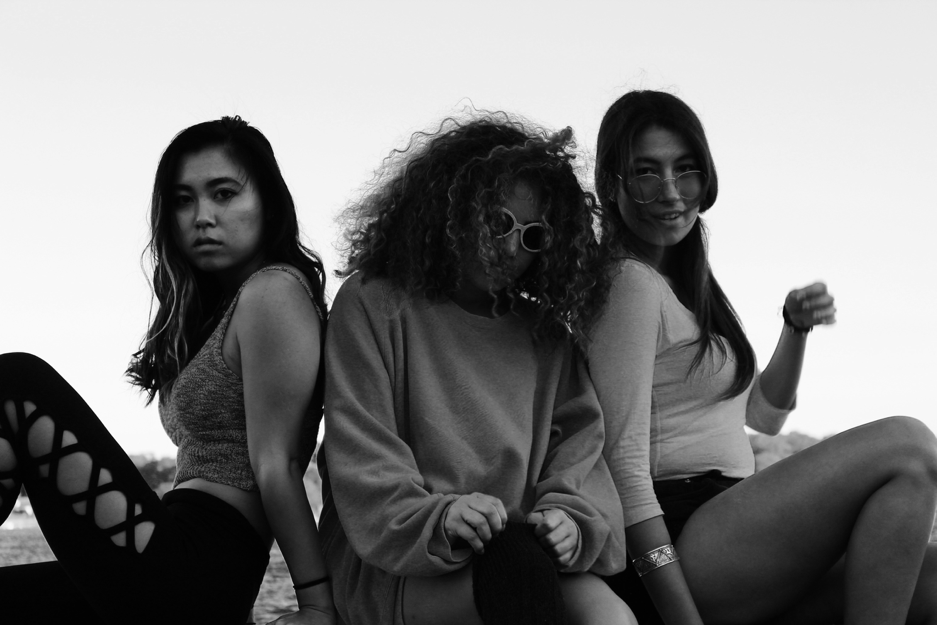
ON THE BRIDGE. BRISTOL, RHODE ISLAND, SEPTEMBER 2017.
"She’ll show how the train comes, its lights screaming us into sightlessness. How she disappears into an abyss of nothing after one single step into something she doesn’t know." - Serene Expression Screenplay
A photo says a thousand words...
I figured that out in high school, when I competed in two photography contests my sophomore year, placing first and second in my class, respectively. The theme for both these photos were buildings in and around The Hague, my hometown. That contest propelled me into the world of recording moments into a frame.
I’m a photographer for the school newspaper at Roger Williams University and have published a story about the Fine Arts section, including photos I took of students in that class.
My main passion is travel photography; especially photos of people from different cultures in their daily lives. For the final project in my art class the first semester at Roger Williams University, I toured Providence and asked people if I could take portraits of them, and I am very happy with the results. Below, I’ve included a few photos I am especially proud of.
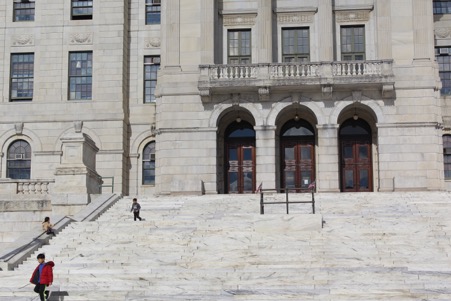
ROAMING.
PROVIDENCE, RHODE ISLAND
NOVEMBER 2017
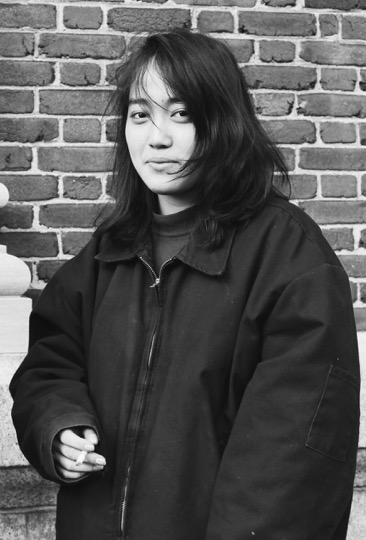
STUDENT FROM THE RHODE ISLAND SCHOOL OF DESIGN.
PROVIDENCE, RHODE ISLAND
NOVEMBER 2017
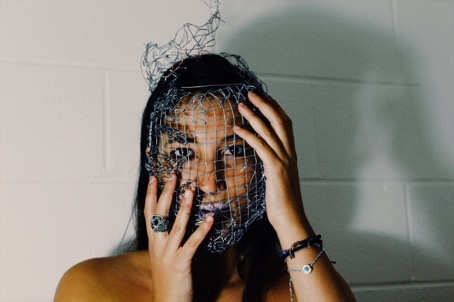
MASK ON, MASK OFF.
BRISTOL, RHODE ISLAND
OCTOBER 2017
Excerpt of "The Oymyakons"
A town in Siberia called Oymyakon is the coldest place in the world. With temperatures consistently around -70 degrees Celsius, the winters in Oymyakon are brutal. Humans have been living there for centuries, hunting whales and polar bears and bundling up in thick coats...
« « «
I am the creator and president of my high school's Writers’ Guild, for which I created “the Oymyakons,” a chapter for a novel we wrote together. In May of 2017, we self-published the novel, which we named “Spark.” This chapter is coincidentally my favorite work, and I am especially proud of the way I helped my peers and how we made the story work despite much discussion.
« « «
Due to the town’s northerly position on the map, December is the most difficult time of the year. Three hours of light await the inhabitants each morning. These cruel conditions have orchestrated the death of hundreds of Oymyakon residents; the rest of the citizens have long since evolved to be something quite like superhuman. Their skin has grown thicker over the years like that of penguins; their lips no longer turn blue; their blood is warm. The population is growing larger with each day. Polar bears and whales have been extinct for nearly seventy years, and the Oymyakons rely on the plentiful amount of fish in the sea to cook their meals. There are no birds in the sky and no living animals roaming the small pathways that make up the incredible ice city the Oymyakons call home.
Occasionally, brave troopers undertake missions out into the unknown world, where herbs and edible plants are abundant. In modern days, it is not the cold that leads these brave souls to their death, but the prospect that once the city is out of eyesight, there is no map to guide them back home. There are no other cultures for miles and miles around. There is nothing but white and cold.
On a December morning one particularly chilly year, a man came to Oymyakon with the aid of only a compass. Dressed in tall snow boots and a coat which made him the size of a bear, he did not quite look like a part of the community of Oymyakon. His lips and fingers were blue; his head so cold, he was just about ready to pass out. He was welcomed into the home of the richest man in town, was placed before a roaring fire and was offered a cup of pine tea. The owner of the mansion, a man named Ilia Popov, was nothing short of arrogant—he was disliked by many, but had still gained position among the top ranks in the town council and had multiplied his already enlarged wealth from there on. Popov was a small man with a pointy nose and somewhat rat-like features; he spoke English, but with an accent no one had ever heard of and one that didn’t go away no matter how much he spoke to the other inhabitants of his society.
A maid set the pine tea down on a side table, and Popov examined the newcomer. The man had been brought to him by his daughter, who had been playing outside. Nina had been frightened by the stranger in the large coat, because she had never seen such an enormous hide in her life. Nina’s friend had shrieked, saying there was some type of animal in Oymyakon; Nina herself had been brave enough to near the visitor, ask him where he was from, and whether he would like to warm up inside her home. Oh yes, the man had replied without hesitating. He was freezing.
After one sip of tea, the foreigner pulled a face and set it back down. This interested Popov, who had decided not to sit down next to the stranger but to stand before him, rather at a distance, to inspect him. Surely the man came from somewhere far away. No one from Oymyakon would freeze to death or turn down a cup of pine tea.
“I em thoroughly eenterested as to who you might bee and vere you have come vrom,” said Popov.
The stranger did not look back at him—his gaze was travelling through the home, which Popov found rather meddlesome for some reason. He knew he owned a large house, and a beautiful one at that—the walls were painted the color of oak to make them look like they belonged in a cozy ski hut, even though they were made of strong steel—there were beautiful pine wreaths adorning the walls—the fire place was larger than twice Popov’s length—
The stranger said, leaning back in his chair, “I have come to warn you.” He spoke perfect English.
Popov swallowed.
“As secluded as your town is from the rest of the world,” continued the foreigner, “you cannot escape the biggest disaster mankind has seen thus far. People are dying just across the Russian border.”
“Oh, men, vat a catastrophee,” said Popov, sarcastically.
“You don’t understand, sir. The plague, the storm, whatever it is, has destroyed a large part of the world already, and it’s coming to Siberia. It’s coming to Oymyakon.”
“How agh you so sure about zet?”
“I’ve been travelling for weeks, tracking the apocalypse and staying well ahead of its hold. I took a train from Moscow, but had to finish the journey on foot. It’s too cold for a train here. Too cold for anything, really.” He shivered; even though the room was normal temperature for non-Oymyakon people, he was still in shock from his arctic voyage.
“Except ven your culture has eevolved,” Popov boasted. “We do not veel zhe cold anymore. I’m sure ve can survive whatevegh is coming. My people agh invinceeble.”
“I wouldn’t be too sure about that. There are countries out there with men stronger than grizzly bears, with women faster than rabbits. Humans have evolved into nothing short of superheroes. Oymyakon is not the only town with enhanced skills and abilities. And yet, thousands of people have been killed.”
Popov scrutinized every part of the stranger. The man had taken off his coat and hung it over the back of the chair, and he was a lean man underneath all the fur, with a light blue blouse and dark pants. He took off his enormous hat, as well, revealing rugged blond hair. Oymyakons didn’t have blond hair. “Vat does zhis mean vor us?” Popov asked, quivering a bit.
The stranger peered down at the tea he had been offered. “There are people coming to save you from the disaster—“ “Oh, zhank you, sir!”
“—but there’s a catch.”
“Vat?”
“Your rescuers will only accept one man and one woman, who will represent Oymyakon for further generations when safer times have developed. Your town is responsible for choosing who that man and woman will be.” He glanced at Popov inquisitively. “Do you think you and the rest of Oymyakon can make that decision?”
Popov’s eyes gleamed. “How very, very grateful I am to have taken you into my home, sir outsider. I em sure zhet, in exchange vor my benevolent nature tovard you, you can promeese me zhet zhis invormation vill be kept a deep, daghk secret…”
“Unfortunately, the rest of the Oymyakons must be alerted immediately—“
Popov advanced on the stranger until his eyes were just a few inches from those belonging to the other man. The stranger backed up in his seat, uncomfortable, for he had not seen anger in the owner of the mansion until now. Behind Popov’s back, the fire roared as if in threat. “Listen to me, sir outsider, my life is very, very eemportant to me end to my daughter Nina. I edvise you greatly to remain silent about zhis ordeal so zhet Nina end I survive as zhe representors of Oymakon.”
“I’m afraid I can’t do that,” breathed the stranger.
“Vell zhen get out of my house!” screamed Popov, in a sudden bout of fury. “You heve done enough!” In that moment, Popov heard the little tremor of breath behind him. He turned around and found Nina hiding behind a cabinet at the far end of the room. The girl, who could barely be older than sixteen, had been spying on him and on their conversation; now she sped out of the door and pretended not to have been in the room at all. “Nina!” Popov shrieked, but there was nothing he could do now—his daughter had heard the entire conversation and, with the good heart Popov knew she possessed, she would tell all her friends what was going on within a timeframe of five minutes.
“It’s good you’re not the only one who knows,” said the visitor from behind him. Popov was trembling with anger; not only did he resent the outsider for making him believe Oymyakon might possibly come to a fall, but he hated the idea of perhaps not being chosen to be saved from the apocalypse the man spoke of. “If you had any contact with the outside world,” continued the stranger calmly, having stood up from the chair and taken the enormous bundle of fur coat in his arms, “you would have long since known what is going on.”
“I say, get out of my house,” said Popov. “Give me time to zhink zhis zhrough.”
The man silently put on his hat, followed by his scarf, followed by his coat and gloves, until he looked like a bear again. “Is there a hotel in Oymyakon?”
Popov looked at him scornfully. “We don’t have guests here.” He watched the man leave—stand stiff for a moment as he opened the door and felt the cold overflowing his body again—a cold in which he would have to keep walking until he found somewhere else to stay—
Popov didn’t let any of his heart become good. He did not ask the man to stay. He merely watched as the door closed. He was alone again. Popov looked at the picture frames on his wall, the ones bearing photos of himself, looking an important part of the Oymyakon council. There was one small picture of Nina, hidden by the door. The rest of the wall was decorated by the massive hide of a polar bear. Hm, thought Popov, his lip curling as he thought of the unwelcome man in Oymyakon, who had brought such perplexing news. He was genuinely intrigued, but also quite wary of the man with the enormous hide. Look et zhat coat he brought wiz him, thought Popov to himself. Vhere’s he vrom, anyvay?
Murder at Circus Fantastique (Short Story)
“Go check it out. See what you can find. I’ve heard it’s creepy, though..."
« « «
I’ve twice been a contender in the yearly “Interscholaire” competition hosted by five schools in The Hague, my hometown; in 2015, this work placed 2nd in the short story category, helping my school to win the language division.
The challenge for the competition was to write a one-page story with only the prompt “Circus Fantastique” to work with; this consequently gave me the idea for an eerie circus with a mystery to solve, in which clues were hidden throughout the story. The piece was to be written in Dutch, but because I am more comfortable with English, I wrote the story in English first and then translated it into Dutch.
Can you figure out why the presumed cause of the man's death doesn't add up?
« « «
“Someone’s gotta do it.” Vince Gold hung up the phone and crept through the abandoned circus. The sky was darkened; the only light that illuminated his path came from the Ferris wheel, which, with its numerous golden lamps, lit up the attraction park just enough for the detective to see where he was going. There was no one around, until Gold fit his way into the biggest tent of the domain. A man with bright blue eyes stood there, examining a poster on the wall. There was a cast around his right leg, and he leaned against crutches.
“Vickie’s caravan,” he said without looking at Gold. The investigator frowned. Then, “Wait.” The man’s bright eyes finally rested on the detective. “I’ll come with you.”
There was something strange about the man, about the way he limped out of the tent without a word. Detective Gold walked after him, past the Ferris wheel and the mini roller coaster. Everything was shut down. There was a chill in the night air. Gold and the man from the tent arrived at a lonesome caravan standing somewhat far away from the rest of the attractions. The thing was old and there was a horrible smell coming from inside. The man stopped for a moment, and looked at the vehicle.
“He’s inside there?” asked the detective. “How long did it take you to find out—”
“The man died sometime today.” The man sniffed.
Gold walked forward, but the man with the injured leg stopped him. “Wait a second. I just want to warn you—weird things have happened inside that caravan. Vickie is the new fortune teller around here. She’s seen strange things. Ghosts, for one thing.”
Vince Gold didn’t believe in the paranormal. He crossed the yard and peered inside the caravan. He coughed. His nose wrinkled. It smelled like dead flesh; a scent he knew well. Gold leaned down the moment he saw the body. It was lying face down on the floor. Gold wiped away a few chards of purple glass from on top of the dead man in order to check for injuries.
There was the sound of footsteps, and a flashlight being swung around the yard. “What are you doing in my caravan?” It was a woman, coming up from behind Gold. God figured she was Vickie, the fortune teller, for she wore a purple turban around her head. Vickie squealed when she saw the dead man.
“That man - he came to my caravan yesterday. He wanted to know his future, so I told him. He smashed my crystal ball when I said he was going to kill someone. He was angry. It wasn’t what he wanted to hear.”
Gold peered at her for a second, unable to say anything. He searched the woman’s eyes, and she looked back at him with an agonized expression. Vince Gold walked from the caravan and sped up to the man with the broken leg, who had already been limping away, bored. “It was an accident, I assume,” said the man idly, staring out into the darkness of the circus. “The guy goes back to the caravan to say sorry to Vickie for smashing her beautiful purple ball, then there’s obviously this ghost who trips him or something like that, and he breaks his neck.”
“No,” said Gold. He didn’t believe in ghosts, for one thing—but he had heard and seen something else that confused him. “Vickie has something to hide. Her story doesn’t add up.”
Dutch translation for the Interscholaire competition:
“Ga het maar uitzoeken, kijk wat je kan vinden. Het is daar griezelig, heb ik gehoord.”
“Iemand moet het doen.” Vince Goud hing zijn telefoon op en kroop door het verwaarloosde circus. De lucht was donker; het enige licht dat zijn zicht ophelderde was dat van het reuzenrad, dat met zijn talrijke kleine lampjes het hele attractiepark bescheen. Omdat het circus al voor de nacht gesloten was, liep er werkelijk niemand rond—totdat Goud de grootste tent in liep, zoekend naar iemand om te spreken.
In de rood en geel gestreepte tent stond een man met zeer heldere blauwe ogen. Hij keek aandachtig naar een poster op de muur. Hij had verband om zijn rechterbeen, en leunde op krukken. “Vickie’s karavaan,” zei hij, zonder naar Goud te kijken. De rechercheur fronste. Toen keek de onbekende man Goud eindelijk aan. “Wacht. Ik kom wel mee.”
Er was iets vreemds aan de hand met de man, die hinkend de tent uitliep zonder verder iets te zeggen. De agent volgde hem, en samen liepen ze langs het reuzenrad en verder de duisternis in. Alles was potdicht en er hing een kilte in de avondlucht. Rechercheur Goud en de man met de krukken naderden een karavaan die afgezonderd lag van de andere attracties. Het ding was oud en roestig, en er hing een vreselijke stank in de lucht. De man met wie Goud liep stopte een poos lang en keek naar de wagen.
“Is hij daarbinnen?” vroeg Goud. “Hoe lang duurde het voordat—” “Hij is vandaag doodgegaan.” De man snoof.
Goud liep naar voren, maar de man hield hem tegen. “Wacht. Doe voorzichtig. Rare dingen zijn er gebeurd in die karavaan. Vickie is de nieuwe waarzegster van dit circus—ze is twee dagen geleden aangenomen en heeft al zoveel onverklaarbare dingen gezien en gehoord…”
Goud had nooit geloofd in paranormale zaken. Hij doorkruiste het dode gras en keek binnen de woonwagen. Door de stank hoestte hij. Het rook naar uitgestorven mensenvlees. Goud hurkte naast het lichaam van de man, die op zijn buik op de grond lag. De ogen van de rechercheur gleden langs het interieur van de karavaan, maar verder was alles op zijn plek. Goud veegde wat scherven paars glas van het lichaam om de staat van het lijk te onderzoeken—geen duidelijke sporen van letsel waren te zien. Goud hoorde voetstappen van buiten de wagen, en hij nam het licht van een zaklamp waar.
“Wat doen jullie in mijn karavaan?” Het was de stem van een vrouw, die de wagen instapte achter de agent. Goud onderstelde dat zij Vickie, de waarzegster was, omdat ze zo gesteld was op deze karavaan. Vickie slaakte een kreet toen ze het lijk zag. “Ik ken deze man. Hij kwam gisteren naar mij toe om zijn lot te horen. Hij pakte mijn glazen bol vast en smeet het op de grond toen ik hem vertelde dat hij iemand zou vermoorden. Dat wilde hij niet horen.”
Goud bestudeerde haar. Zij keek terug naar hem met een peinzende blik, en volgde hem met zijn ogen terwijl hij de karavaan uitliep. De rechercheur ging achter de man met de gebroken been aan, die al, verveeld, wegliep. “De dood van die man was een ongeluk, neem ik aan,” zei de man oppervlakkig. “Hij was teruggegaan om zich tegenover Vickie te verontschuldigen, voor het vernietigen van haar paarse bol. Een geest zorgt dat hij struikelt, hij breekt zijn nek—”
“Nee,” zei Goud. Hij geloofde niet in geesten, maar dat was niet waar hij verontrust over was. “Het verhaal van Vickie klopt niet; dat weet jij ook. Vickie verbergt iets.”
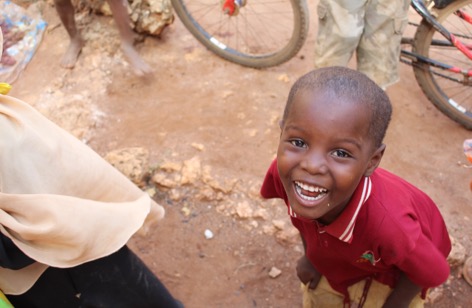
CLOUD NINE. ZANZIBAR, TANZANIA, DECEMBER 2016
Photography competition (2015)
The idea was simple: recreate an old photograph originally taken in The Hague, my hometown. The second photo you see below was taken by me in 2015, and it won first place in the competition hosted by my class.
The Bijenkorf is a Dutch chain of high-end department stores in existence in Amsterdam since 1870. The second store was constructed in The Hague in 1926, the same year the first photo below was taken.
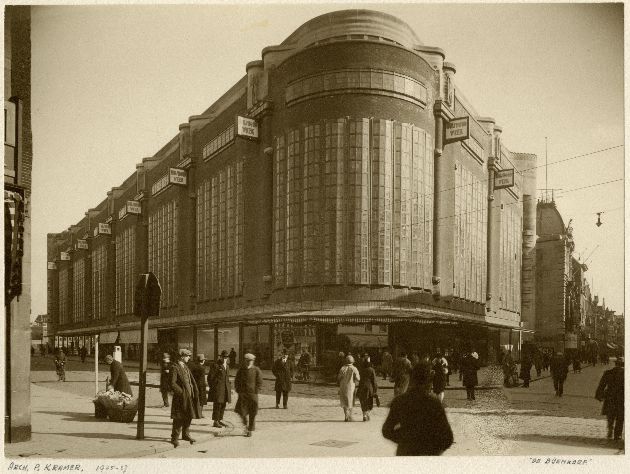
Bijenkorf, The Hague, 1926 - courtesy of Collectie Haags Gemeentearchief
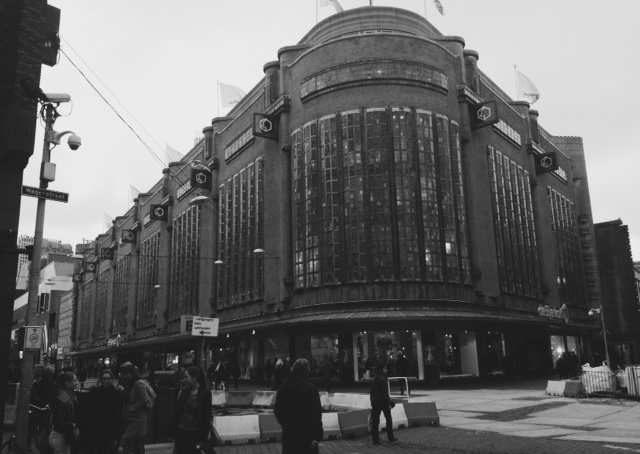
Bijenkorf, The Hague, 2015
